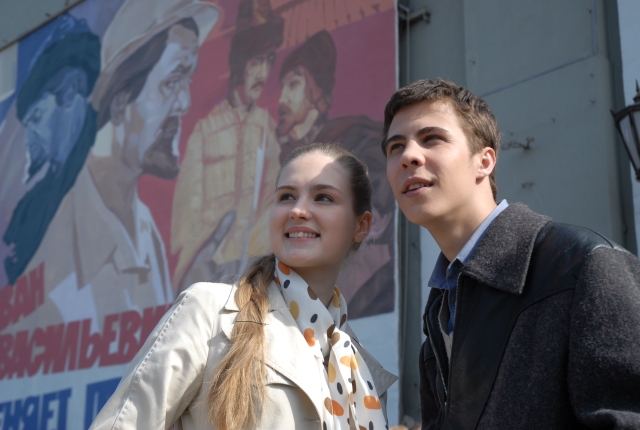
This year’s Russian Resurrection Film Festival is as topical as ever, delivering a showcase of new Russian cinema that is dominated by social and political commentary on the country’s past and present. A highlight includes Karen Shakhnazarov’s most personal film to date, Vanished Empire. Essentially, this film revolves around a dramatic love triangle between three Moscow university students, but the historical period within which these students live shapes much of their character development. Set in the early 1970s, during the peak of Soviet power, Vanished Empire is a nostalgic return to an exciting adolescent past, and to the calm before USSR’s deterioration. This film succinctly captures the challenges that were already influencing everyday life (when Pink Floyd records and label jeans were available only through the dodgy black market), while also weaving in a growing sense of foreboding. It is easily one of the festival’s most watchable offerings, with a touching central storyline and some very relatable characters.
Captive is more explicitly political. From director Alexei Utichel (whose films Dreaming of Space and The Stroll have been featured in past Russian festivals), Captive exposes the folly of the recent Chechen war by portraying meaningless violence, death and destruction from all sides. While some knowledge of the conflict is probably desirable for a more worthwhile viewing experience, it is easy enough to follow the film’s central narrative. A group of Russian soldiers has been isolated in unfamiliar Chechen territory, and two of their number, a responsible commander and an impetuous snipper, have been left with the responsibility of locating a local guide to facilitate their escape. They seize a Chechen boy, but, in the process of drawing him back from the village to their troupe, an interesting rapport develops between the three, with some unexpected consequences. This film makes emotional involvement very difficult, with plenty of dislocated dialogue and long, meandering scenes of silence, so you’ll need to be in the right state of mind. Its conclusion is extremely powerful, though, and its message very important. At just over an hour, Captive presents but a small slice of the tragedy that that has plagued that area in recent time.
The (post-)courtroom drama, 12, also touches upon the Chechen conflict, by exploring its impact upon racial attitudes in contemporary Russia. From director Nikita Mikhalkov (who received an Oscar nomination for Burnt by the Sun), 12 is a distinctly Russian adaptation of Sydney Lumet’s 12 Angry Men. Based around a similar premise, it begins just after courtroom proceedings, as a group of 12 middle-aged male jurors are left alone to reach a unanimous conclusion. Unlike the original, however, where the accused is of African American descent, the accused is now Chechen, and therefore inspires similarly racist sentiments from some of the men. Only one of them is brave enough to speak out in the boy’s defence, but in doing so he provokes the other 11 jurors to think in more depth about the case. As they look further into the intricacies of the accusation, the men also reveal more about themselves and their personal pasts; each of them has in some way been touched by Russia’s tumultuous history. Intriguing up to its finish, 12 ideally captures the pervasive nature of the past. With some fascinating revelations and some solid performances, this film is a real festival highlight.




No comments:
Post a Comment